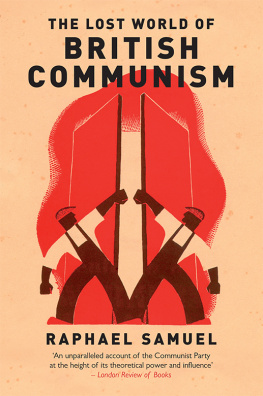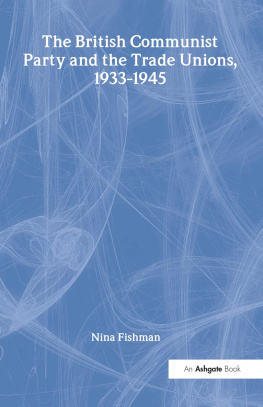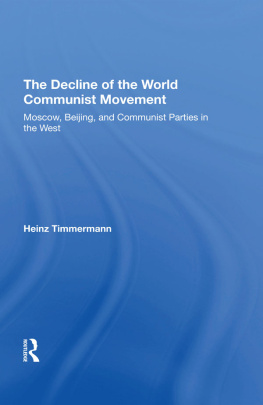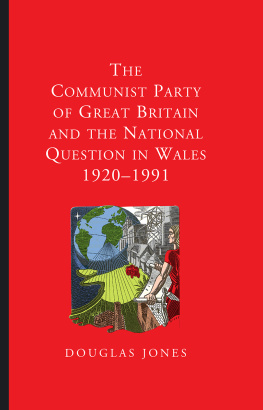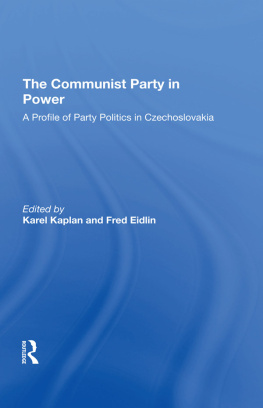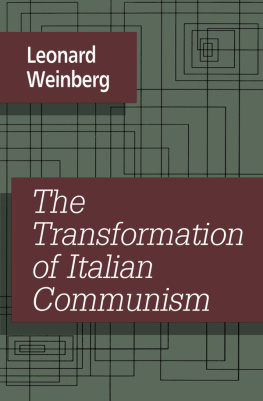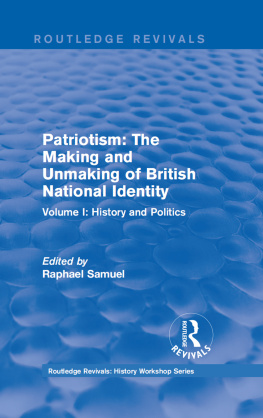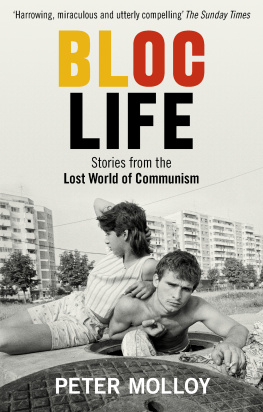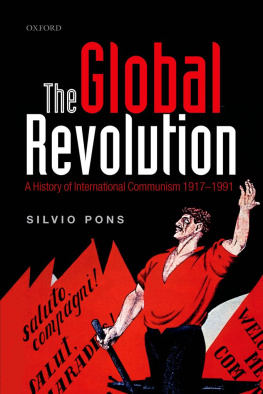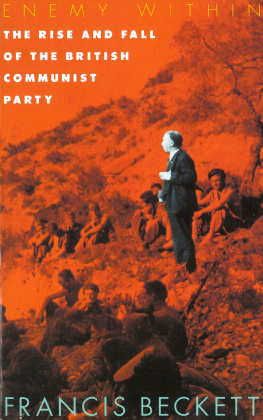THE LOST
WORLD OF
BRITISH
COMMUNISM

This edition published by Verso 2017
First published by Verso 2006
Raphael Samuel 2016, 2017
Preface Alison Light 2006, 2017
The Lost World of British Communism first published in New Left Review no. 154, November/December 1985; Staying Power: The Lost World of British Communism, Part Two first published in New Left Review no. 156, March/April 1986; Class Politics: The Lost World of British Communism, Part Three first published in New Left Review no. 165, September/October 1987
All rights reserved
The moral rights of the authors have been asserted
1 3 5 7 9 10 8 6 4 2
Verso
UK: 6 Meard Street, London W1F 0EG
US: 20 Jay Street, Suite 1010, Brooklyn, NY 11201
versobooks.com
Verso is the imprint of New Left Books
ISBN-13: 978-1-78478-041-8 (PB)
ISBN-13: 978-1-78478-637-3 (UK EBK)
ISBN-13: 978-1-78478-638-0 (US EBK)
British Library Cataloguing in Publication Data
A catalogue record for this book is available from the British Library
Library of Congress Cataloging-in-Publication Data
A catalog record for this book is available from the Library of Congress
Typeset in Adobe Garamond by Hewer Text UK Ltd, Edinburgh
Printed in Great Britain by CPI Mackays
Contents
In the essays published here Raphael Samuels footnotes speak volumes. Firstly there are the sources which you would expect to find in any mapping of a history of the Communist Party of Great Britainnamely, reference to the works of other historians, scholars and commentators of different hues, political writers and journalists. Mingled with these are a generous measure of citations from other, less obvious printed materials: articles and extracts from the Party and Labour press, the minutes of committee and branch meetings, reports to World Congress or to local meetings, quotations from the encyclicals that came down from Party Headquarters and the Comintern; then, what the Party called Lit. the handbooks and manuals for recruiting and training, pamphlets and periodicals, the Marxist classics plus more ephemeral materials, like cyclostyled handouts, leaflets, bills and posters, that have been excavated somehow from archives and personal collections; in addition, correspondence and the working papers of Party leaders and gurus. No less plentiful are the extracts from the published autobiographies and memoirs of Party members, agitators and organizers, from sympathizers and fellow-travellers, defectors and renegades, trade unionists and autodidacts, as well as novels and poetry written by those on the Left. Add to this a plethora of interviews, conducted in the flesh or by telephone with veterans and others a printer in East London, a radical tailor from the clothing factories of Leeds, Communist engineers in North London and Manchester, a woman progress chaser in Slough, amongst them whose voices jostle for place alongside those of Lenin, Palme Dutt or Mao. And then, beyond these reaches of written or oral evidence, different kinds of historical scrutiny: what Communists sang or watched at the cinema, what they wore, (open-necked shirts, if they were men, with a pen or pencil prominently displayed in the breast pocket; jumper, slacks and sensible shoes if they were women); how Party members comported themselves in public (they were urged to be neat and clean); where they went on holiday if indeed they took holidays preferring bracing walks in bleak settings; the content and feel of their homes, which were usually uncomfortable, with a small shrine of books and the garden left a wilderness, the author tells us, for want of personal time. Here is the lost world of British Communism evoked as a totalizing political culture not only through its public documents and official records, but also from a panoply of the everyday its customary habits and objects, like the soccer annual issued by the Daily Worker and eagerly awaited each year by the young Raphael Samuel. Not a world of ghosts but of recognizable human beings, with dreams and desires, in a place where ideas were lived.
The range and variety of materials that generate Raphael Samuels thick descriptions became something of a hallmark of his history writing. This method was crucial to the arguments in his major opus, Theatres of Memory (1994), which champions the sources of unofficial knowledge as evidence of an expanding historical culture in contemporary society. In the following essays it functions rather differently. Here, Raphaels aim is to reconstitute a political mentality and to adumbrate a history of British Communism from below, making connections between its official statements and outer structures, and the inner worlds of its inhabitants true believers, as he calls them. It means, at one end of the spectrum of inquiry, rigorously analyzing the history, language, organization and public face of the Party; at the other, it leads him to interview members of his own family, especially his mother and his aunts, who had been Party members, and also, unusually for the times, to treat himself and his memories as historical material. British Communism, he maintains, was a deeply moral universe. Provocatively, he wants to say something about the secret sources of moral energy and the psychology of self-perception including self-deception upon which political activity, of whatever kind, must rest.
Amongst the footnotes are also a number of friendly asides from writer to reader. At the end of each essay the author usually emphasizes the provisional, on-going nature of the research: he asks for criticism and more material to be sent in by readers; he explains that for reasons of space, he hasnt been allowed to include more pages. In this particular case at least two (or is it three?) further chapters are in progress. These are not empty gestures or mannerisms. Raphael worked by endless revision and consultation, and with a sense of perpetual alert that may have owed something to his Communist upbringing; as perhaps did his resistance, in middle life, to the idea of infallible authority.
When the essays were originally published, some comrades wrote, as requested, to offer information and corrections or to share their experiences and stories; others were more rancorous and took up the cudgels, having a go at the author. It does illuminate, however, an unusual facet of the work, though not in the way the letter-writer intended. What is novel and perhaps unique about these essays is not only that such personal accounts of belonging to the Party were, and are still, rare but also that this is a historian describing the world of childhood and adolescence, and the experience of growing up as a child Communist.
Born in 1934, Raphael Elkan Samuel was part of an extended Jewish family in London where, on his mothers side, political activity began to take over. Passover, still celebrated out of respect to his Yiddish-speaking grandmother, began with Hebrew prayers and ended with Soviet songs. His mother, Minna Nirenstein, joined the Party in 1939 and became a dedicated activist and organizer, later a shop-steward in an aircraft factory and one of the first women to join the Amalgamated Engineering Union when it allowed in women in 1943. Her devotion to political work eventually broke up her marriage to Barnet Samuel, a more orthodox Jewish lawyer. Raphael emphasizes what he shared with those others who were a peculiar people, within the church militant of the British Communist Party. Communism, he writes, was meant to offer a complete social identity. From infancy to the age of twenty-one he lived in a closed world where his reading, friendships and social life were all dominated by politics (this was the boy who sold the

